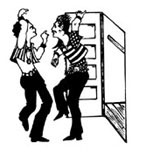
Homosexual Memoirs for Catholic Freshmen: Why?
NOWHERE NEAR HEAVEN'S COAST
I have always looked to the Christian university as a haven of sorts. But there are many signs that all is not well on Christian campuses. As the mother of teens who are approaching college age, I’m disturbed by the extent to which the moral relativism of our popular culture has made inroads at Christian universities. One example is the reading required of freshmen this year at the University of St. Thomas, Minnesota’s largest Catholic institution of higher learning.
Each fall, St. Thomas requires freshmen to read a “common text.” This is a book that all freshmen in English classes must read and that is recommended as reading for the whole campus community. The book becomes the focus of a semester-long discussion, culminating in a series of campuswide activities during “common text week.” In fall 1999 the freshmen are required to read a book with the pleasantly celestial title of Heaven’s Coast by Mark Doty. Heaven’s Coast is Doty’s memoir of the death from AIDS of his homosexual partner, Wally. The book chronicles Doty’s grief and offers his musings on life, death, and sex.
Consider the notion of sexuality that Doty presents to freshmen at this Catholic university. In Doty’s eyes, sex is about pleasure, period. Sexual desires are — in his would-be poetic phrase — “the ties by which the body threads us to the world.” For Doty, the ultimate metaphor for pleasure is in the dreamy words uttered by another homosexual after a massage: “My whole body feels like a penis.” Even on his deathbed, Wally lusts for other men: his male nurse, the handsome guy next door, indeed “anything in pants.” But Doty is not jealous. This is just “Wally’s way of loving the world.”
Sex, in Doty’s and Wally’s view, has no moral component. Rather, it is “a way of entering the present, of moving through this moment’s offerings toward the next.” At a writing workshop for men with AIDS, Doty talks with a homosexual man who has lost many acquaintances to the disease. As the two exchange accounts of their ordeals, they agree about the “persistence of desire, about still wanting, no matter what.” His companion concludes: “It was my dick that kept me alive.” Which moves Doty to wonder, “Is lust a form of hope?”
You May Also Enjoy
Our emotions and habits may oppress our awareness of the nature of our free will and the grace of God to assist us in all our trials.
Young Christian faithful need to engage with the contemporary world while pursuing their chosen life's work.
There are campus activists and groups-- who are not necessarily Catholic or even Christian-- at Ivy League colleges fighting for traditional moral values on marriage and sexuality.

